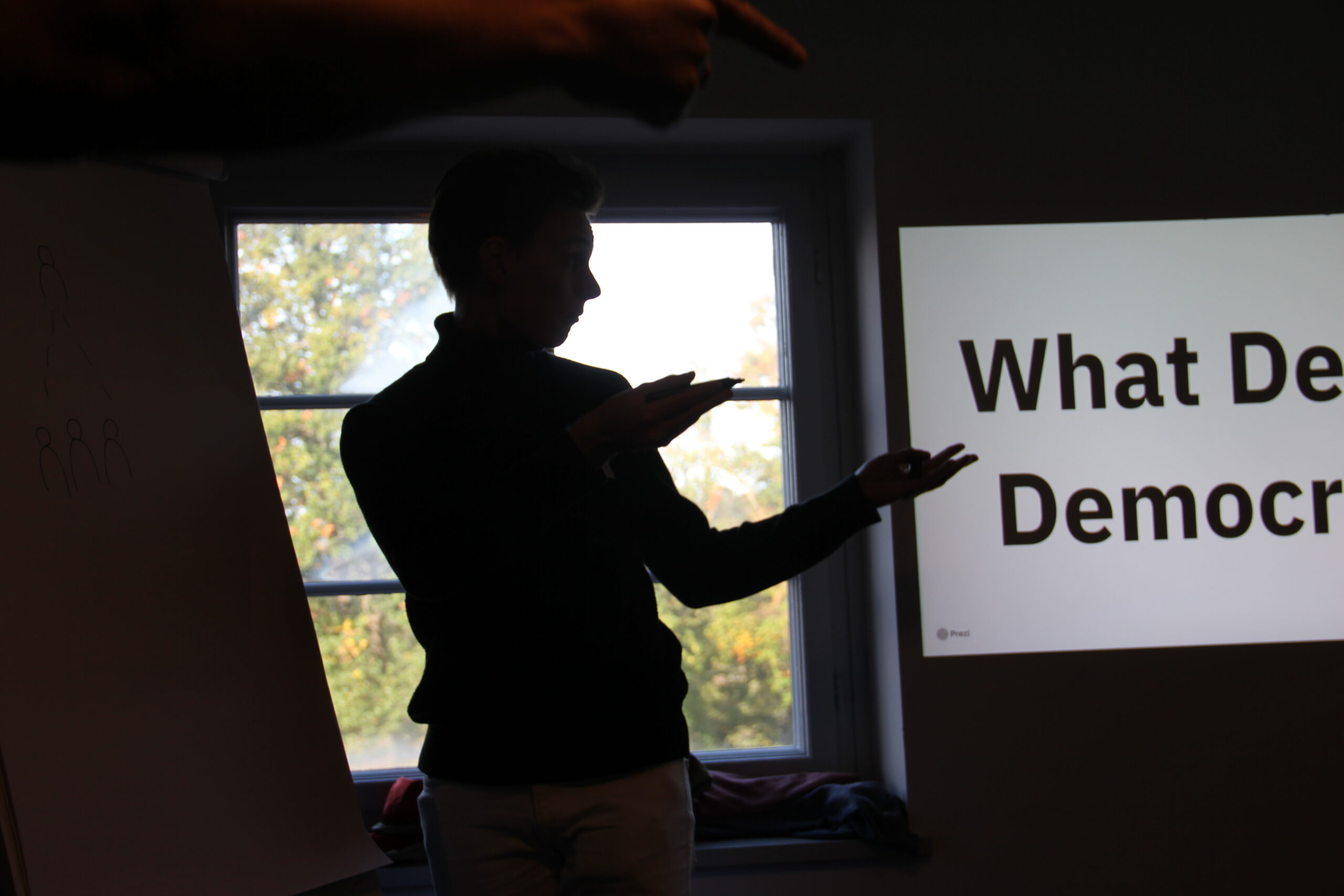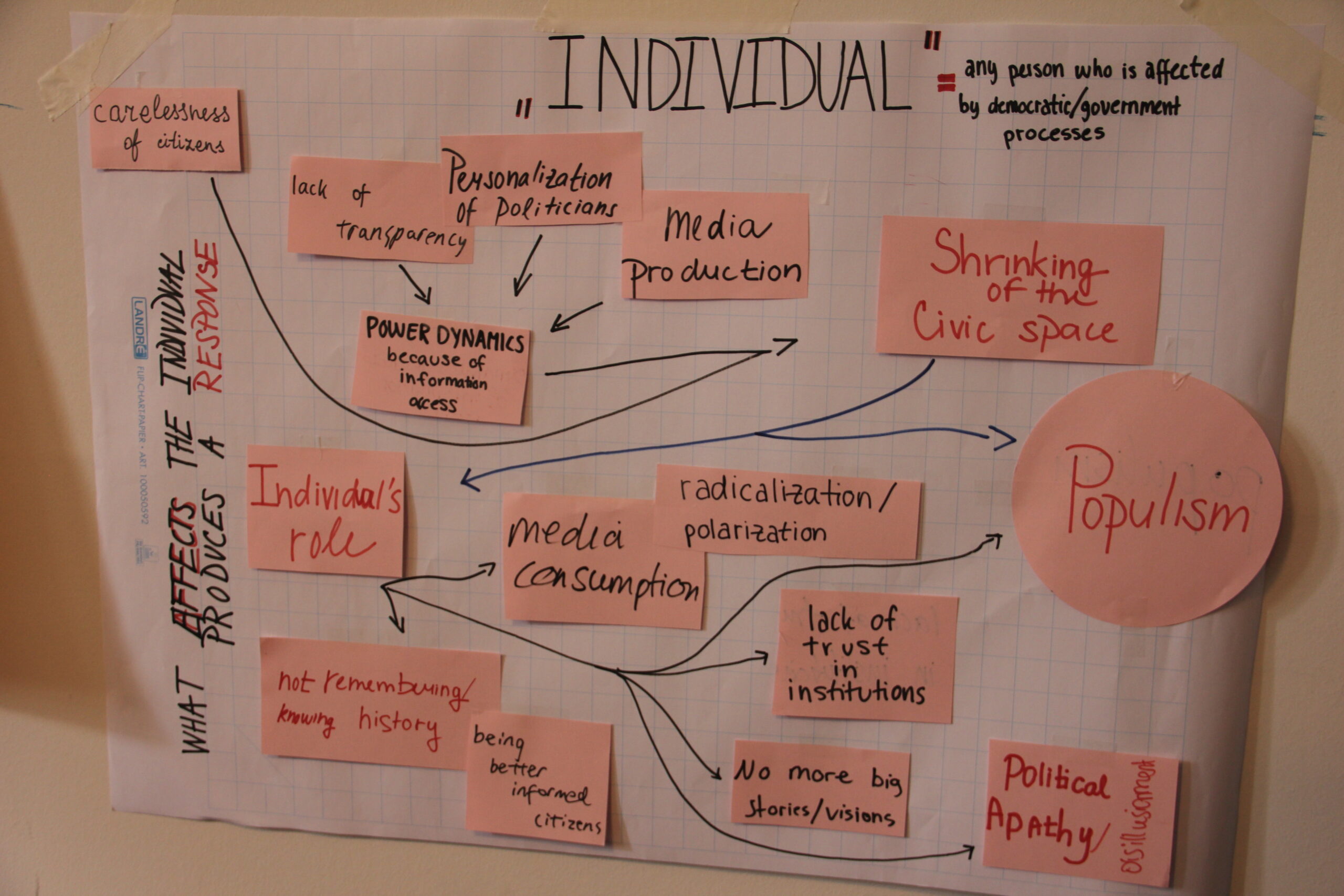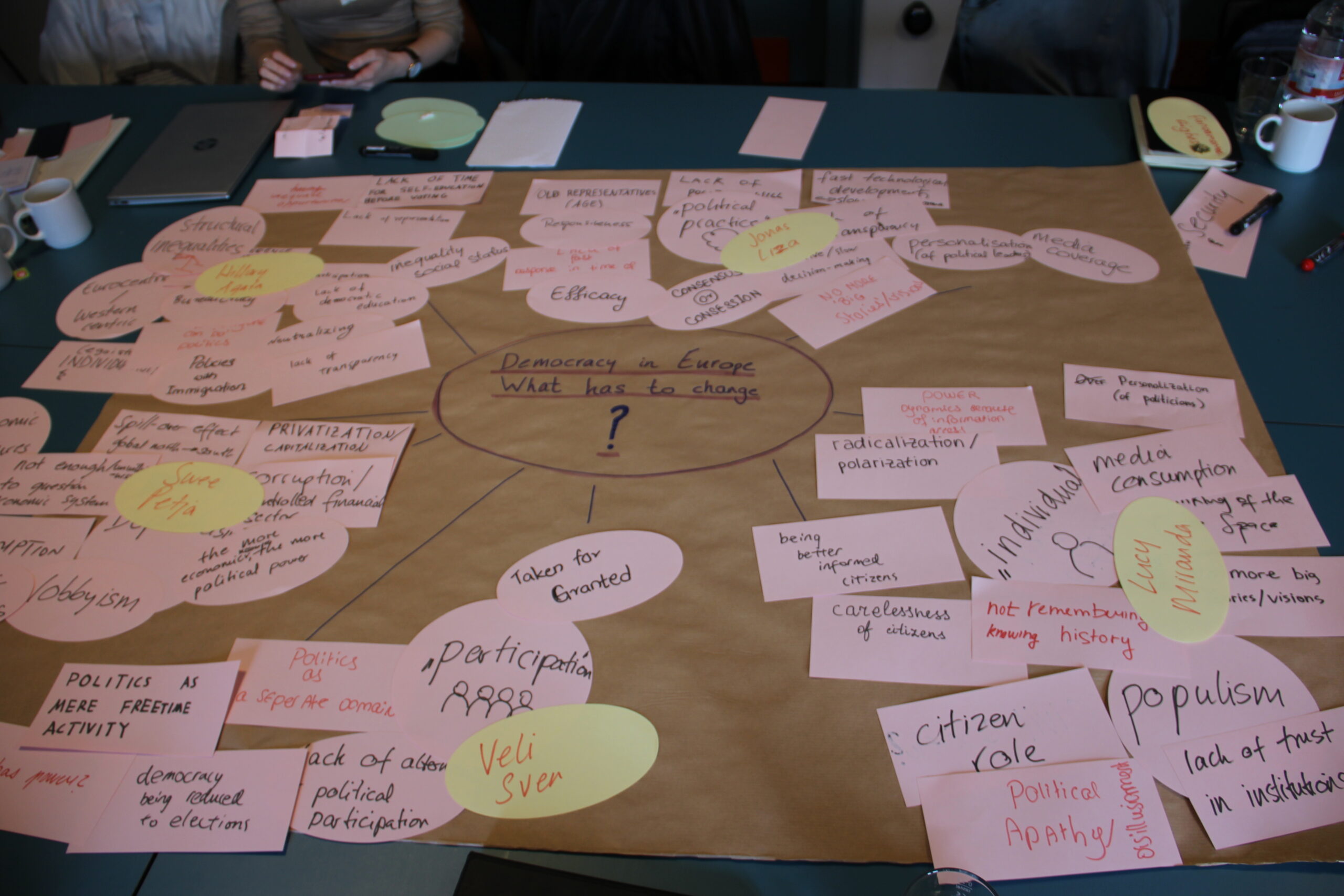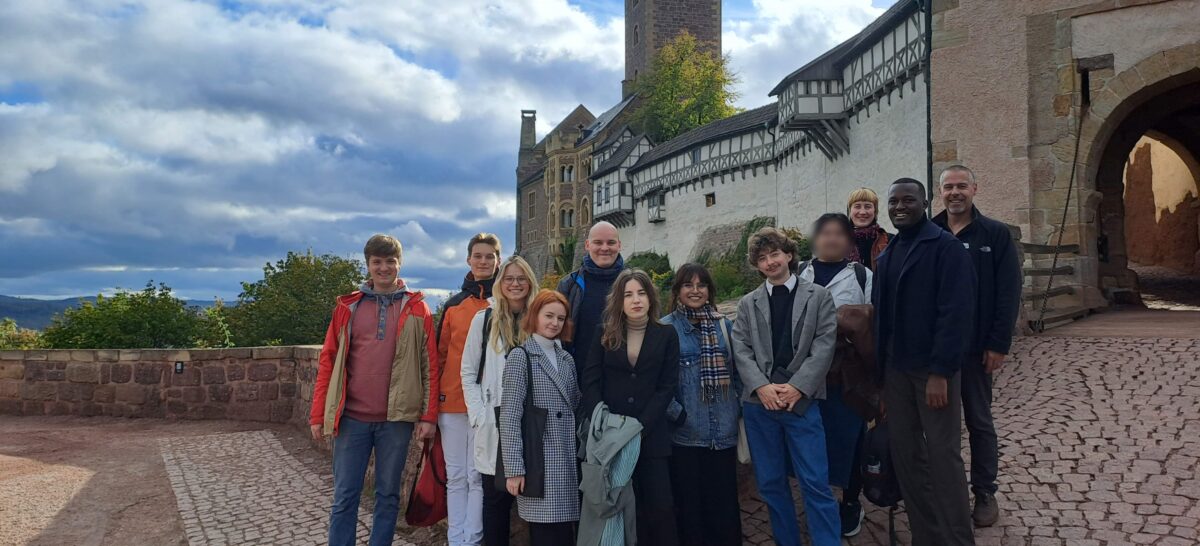Zum ersten Mal fand 2023 das internationale Studierendenforum zur Zukunft der Demokratie statt. Zehn Studierende aus neun Ländern und vier Kontinenten fanden sich in Eisenach ein. Gemeinsam diskutierten sie, wie die Zukunft der Demokratie aussieht und wie diese gemeinsam gestaltet werden könnte. Der Höhepunkt des Studierendentreffens war zweifellos die Entwicklung der sogenannten „Wartburg-Declaration“. Dieses Dokument enthält die wichtigsten Erkenntnisse und Empfehlungen der Studierenden sowie eine umfassende Vision für die Demokratie im 21. Jahrhundert. Hier folgt nun die englische Declaration, wir wünschen viel Freude und Inspiration bei der Lektüre!
Introduction
In many places around the world the very basis of democracy is being threatened by actors that question its legitimacy and efficacy. Still, every person that strives for a more just and equal world knows that it is the system that best guarantees political rights, freedoms, and the basis for a better world. Although it is not a perfect system, Democracy can adapt and improve through our conscious and constant action.
We, as the students of the Wartburg Festival, gathered from around the world to discuss and tackle the current challenges that Democracy faces. Through exchanging experiences and ideas, we developed a Vision of the Future of Democracy, achievable through positive change around four core themes:
- Community-based political participation
- Accessible and equitable participation
- Access to information and democratic education
- Pluralism in identities and opinions
We believe that real change is possible! Thus, we call for the following proposals:
- State funded community centers that offer space for local participation and the expression of different identities.
- Guidelines for the quality of participation.
- Easier accessibility through alternative ‘digital’ channels of participation.
- Creation or further strengthening of non-partisan institutions, such as fact-checking institutions, and supporting institutions for local participation.
- Enshrine mandatory democratic education in school curricula.
- Time and money for individual participatioxn.
This declaration is the foundation of a network of students who share the same concern for the health of European democracies, but also the hope for a better future.
Goal 1: To Create Community Centers as Places for Local Political Participation
Justification: Community centers ensure that people can address their concerns and are involved in decision-making. The decisions taken in these Centers need to have direct impact on a local level and have influence on higher levels of political decision-making. These centers should be supported by a national institution. They will help achieve the following goals and values:
- The right to directly partake in decision-making.
- The right for everyone to have their voice heard.
- Community-focused and people-focused solutions.
- Motivate and empower citizens.
- Make participation easily accessible to everyone.
- Encourage initiative and self-organization by citizens.
Implementation: Push from the government on a national level to create a non-partisan institution that steers the creation of Community Centers, located in each political district. The institution should also oversee the smooth-running of these community centers by:
- Providing assistance and guidelines, as well as information on political processes.
- Providing online and analogue ways for citizens to raise topics, concerns and ideas.
- Each district must dedicate a place as their respective Community Center.
- Informative events must be organized in all Community Centers to explain to citizens how the Centers will work and how they can participate.
- Twice a month (every other week) people are given time off work to attend citizen meetings. The state obliges employers to comply with this.

Goal 2: To foster Accessible and Equitable Participation
Justification: Individual needs in different areas of participation must be met. Actions must be taken to counter potential barriers to participation. Three particular areas of participation, we identify, are public discourse, community-based action, and elections.
- Regarding public discourse, issues around language barriers, level of digital literacy, and asymmetries in power dynamics in the arenas of discussion and deliberation are concerning.
- Regarding community-based action, we need to address (perceived) exclusion and the lack of communal infrastructure.
- Regarding elections, the concern is primarily with structural barriers for participation, such as the exclusion of people based on their legal status, as well as insufficient individual resources.
Implementation: To tackle these problem statements, we suggest the implementation of the following:
- In order to ensure the public discourse required for democracy, institutional level actors such as media platforms must provide digital and analogue translation options (including sign languages); communities should take collective action to ensure a high level of digital literacy. And to safeguard these ideals we call for wide support for independent media, as stated above.
- To ensure that community-based action is open and accessible to everyone, states should allocate funds for community infrastructure, including but not limited to community centers. A prerequisite to acquire these funds should be following the guidelines mentioned below.
- And to ensure that elections are accessible for everyone, we demand that the prerequisites to partake in elections be lowered in case they exclude people on the basis of their legal status. Furthermore, individuals must be allocated sufficient resources, such as adequate time and relevant social services, to ensure they can partake in such political activity as a voter, participant in a citizens‘ assembly, and/or as a representative.

Goal 3: To promote civic and democratic education among the citizenry.
Justification: As a fundamental basis of true democratic society, the citizens contain in themselves the power to decide and shape their future. Considering the fact that information is influential and essential, this power – the power of people – might multiply its impact, if the state prioritizes the promotion of an informed citizenry.
As parts of the positive results of implementation of this concept, well-informed citizens are:
- more likely to engage in various aspects of civic life, including voting, volunteering, and advocating for policies they believe in. Informed voters make educated decisions that reflect their values, leading to a more robust and responsive democracy.
- a „watchdog“ for government accountability. When citizens are knowledgeable about their rights, constitution, and the rule of law, they can hold elected officials and public servants accountable for their actions. This oversight ensures transparency in governance, which we consider as a significant point in democratic systems.
Therefore, it gets clear that the concept of „well-informed citizen“ is one of the key goals on our way to democracy and plays a crucial role in the functioning of government, and decision-making processes within the state in general. Well-informed citizens are the cornerstone of a healthy democratic society.
Plan: Government institutions and civil society organizations should provide democratic education, and enable the transparency, accessibility and factuality of information. If such goals are achieved, democratic values are realized as political knowledge makes possible fair deliberation of political issues.
Implementation: In order to create a society of educated and informed citizens:
- The government should show more interest in making a plan that would include education about the democratic system. This would include seminars organized by experts sent by the government to school. These experts could show the system in a more practical way – showing how elections work, going to the parliament, talking about citizens‘ assemblies and referendums, etc.
- The government also must be transparent and open-minded. This transparency of information could be achieved in part with digital means, with a „democracy app“ that enables citizens to take initiatives and vote on them, conduct polls, follow government proceedings and the results of implementation of passed proposals, and enable the reading of government documents released to the public.
- For high quality information, there is a need for fact-checking institutions that would prevent manipulation. These institutions both include experts and ordinary citizens, so as to keep experts in contact with citizens and vice versa. The ordinary citizens would be selected with a fractional representation of different social groups, and within said groups there would be randomized selection (lottery).
Goal 4: Create Enabling Environment for Pluralism
Justification: We discern two varieties of pluralism. On the one hand we discern social pluralism. Social pluralism concerns the personal identity of individual citizens but also of identity groups within society. Personal and group identity consist of certain characteristics such as gender, race, sex, religious belief et cetera. Social pluralism is therefore the idea that there are various identities in society based on these characteristics. On the other hand, we also discern political pluralism. Here, instead of focusing on people’s characteristics, we look at people’s different ways of expressing themselves politically. While we acknowledge that political expression is everywhere, we discern media and parliament as the most important spheres where political expression, and thus political pluralism takes place. Just like social pluralism, this political expression can take many forms.
With social pluralism, the goal is to maintain and safeguard different identities such as cultural, social, ethnic identities. It is crucial for a healthy democracy to have a multiplicity of voices, to ensure that political discourse remains fair, inclusive, and rich. At the same time we acknowledge that some social groups and identities are vulnerable to abuse or suppression and therefore require special protection. We also need to foster an environment that would encourage the exploration and creation of (new) personal identities.
Implementation:
- One way to do this is to establish “cultural exchange centers”. These are centers where identity exploration can happen. They would be open, publicly accessible spaces where different identity groups can organize activities that express that specific group’s identity. This expression also includes the political expression of identities. Within these identity groups, people can explore their own politics and debate about their personal needs and desires and thus become politically engaged. In these kinds of spaces, there is also the possibility of different identity groups interacting with each other which causes them to adjust their preconceived notions about the other and eliminate biases.
- Another way to promote social pluralism is for schools to implement courses on the importance of diversity and the exploration of personal identity into their curriculum.
With political pluralism, the goal is to engender healthy democratic debate. By this we mean debate that is respectful, includes different political perspectives and includes engaged discussion. Part of this is to increase access to political information that is relevant to current salient political debates. This means that both citizens and politicians should have equal access to necessary information to form a well-informed political opinion. There is a need to stimulate a variety of political opinions and a diversity-focused independent media is one of the main tools to do this. Diversity-focused media means that there are different stories being told which can align with different political perspectives.
Implementation:
- Obligatory parliamentary debates: these are debates on current important issues which are obligatory to all members of parliament. Within these debates it is expected of parliamentarians to actively engage with the subject at hand.
- Media: implementing measures that prevent the monopolization of media. This allows the media to remain pluralist in the sense that it provides citizens with different viewpoints.
Conclusion
In conclusion, the discussions and collaborations at the Wartburg Festival have highlighted the critical importance of defending and fortifying democracy in the face of emerging challenges. As students, we all recognized the essential role of democracy, however imperfect, as a fundamental tool that supports political rights, freedoms, and the pursuit of a just and egalitarian society. The identified core themes of community-based political participation, accessible and equitable participation, access to information and democratic education, as well as the promotion of pluralism of identities and opinions, collectively form a Vision for the Future of Democracy.
In response to our shared concern for the health of European democracies and our collective hope for a better future, we, as a student network, present a statement that serves as a rallying point for our commitment. This declaration summarizes our common vision for the future of democracy and lays the foundation for our collaborative efforts. It not only reflects our aspirations, but also provides a roadmap for concrete actions that can positively influence the democratic landscape.
Within this statement, we propose specific measures aimed at strengthening the democratic infrastructure. These include advocating for state-funded community centers, formulating guidelines for quality participation, promoting digital channels of participation, supporting non-partisan institutions, incorporating mandatory democratic education into school curricula, and allocating resources for individual participation. These proposals are not mere theoretical notions, but represent a practical and actionable agenda that, once implemented, can contribute to the strength and inclusiveness of our democratic systems.
This statement, therefore, serves as a catalyst for our network of students who share common concerns about the state of democracy in Europe. It not only articulates our shared values and principles, but also outlines tangible steps we can collectively take to address current challenges. Through this shared commitment and focused action, we envision a future in which democracy thrives, characterized by active citizenship, informed discourse, and a resilient democratic base.

